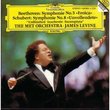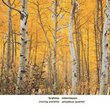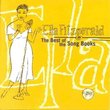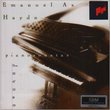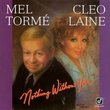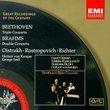| All Artists: Douglas S. Moore, Emerson Buckley, New York City Opera Orchestra, Beverly Sills, Frances Bible, Walter Cassel Title: The Ballad of Baby Doe Members Wishing: 0 Total Copies: 0 Label: Deutsche Grammophon Release Date: 4/20/1999 Album Type: Original recording remastered Genre: Classical Style: Opera & Classical Vocal Number of Discs: 2 SwapaCD Credits: 2 UPC: 028946514825 |
Search - Douglas S. Moore, Emerson Buckley, New York City Opera Orchestra :: The Ballad of Baby Doe
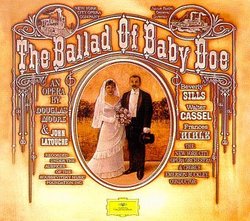 | Douglas S. Moore, Emerson Buckley, New York City Opera Orchestra The Ballad of Baby Doe Genre: Classical
Despite its somewhat Disneyesque title, The Ballad of Baby Doe is one of the sturdiest American operas. Its riches-to-rags story of Colorado miner Horace Tabor has a great plot, excellent characters, real arias, and dynami... more » |
Larger Image |
CD DetailsSynopsis
Amazon.com Despite its somewhat Disneyesque title, The Ballad of Baby Doe is one of the sturdiest American operas. Its riches-to-rags story of Colorado miner Horace Tabor has a great plot, excellent characters, real arias, and dynamic chorus scenes, and none of it sounds second hand in the least. The opera has an extremely inviting personality of its own. This recording by the New York City Opera is full of crackling fast tempos from conductor Emerson Buckley and great theatricality: right down to the minor characters, everybody knows what they're about. Beverly Sills, Walter Cassel, and Frances Bible all inhabit their roles completely. The one drawback is the recording quality, which is good to voices but mushy on the orchestra. To know what's really going on in the piece musically, one must hear the similarly well-sung but more relaxed 1996 recording made at the venue where the opera was premiered: Central City Opera in Colorado. --David Patrick Stearns Similarly Requested CDs
|
CD ReviewsA new generation can fall in love with Beverly Sills! K. King | Birmingham, AL | 01/06/2000 (5 out of 5 stars) "... and not just with Sills, but with a fine American opera as well. This is one recording which Sills fans have demanded be reissued for years. She's in glorious form here and in radiant voice throughout, (her high D natural in the "Willow Song" will knock your socks off), and the moving final scene could bring a rock to tears. The rest of the cast is uniformly excellent, and though it is 30 years old now, the engineers have made this recording sound fresh and new again. This was the recording that made me fall in love with Sills many years ago, and led me to explore other operas as she recorded them. I hope that people (especially younger people) who may be put off by opera as an "alien" art form will give this set a try and listen to how wonderful a "show" this is. My money says it will lead newbies to other American classics such as Barber's "Vanessa"--but the big bucks says Sills will win you over from her entrance scene, and the effect of her dramatic characterization and beautifully unaffected singing will stay with you long after the opera's stunning final scene. This release proves once more why "Bubbles" is a national treasure!" Sills IS Baby Doe! Gapare Pacchierrotti | Canada | 01/07/2000 (5 out of 5 stars) "I fell in love with this opera through this recording. I have another which claims to be the original cast ( for those who don't know, Beverly didn't create the role ), and as fine as it is, this one stole my heart. The impersonation are wonderful, and you really feel that the singers actually identify with the real historical characters on which the opera is based. This isn't just a rags to riches story, but a rags to riches to rags story. Moore's music is simply wondrous, and unlike so many English operas where the music seems at odds with the words, or extremely artificial, the words and music work perfectly with each other. I have to agree that the newer version has a better reproduction of the orchestra, but the singers are nowhere near as involved with making believable characters out of the story. This cast is one of those miracle casts that so seldom show up. Each piece is so moving and I found myself in awe from the beginning of the Willow Song clear to the lullaby that ends the opera. This later piece will leave you in tears. If one has never experienced American Opera, start with this wonderful work. It is far more delightful and melodious than Barber's Vanessa, or his Anthony and Cleopatra. Moore also wrote other works that are every bit as lovely as this. It is a super buy!" Superb...this is the recording we have been waiting for! Gapare Pacchierrotti | 08/11/1999 (5 out of 5 stars) "Listening to this recording again, I think back on the many wonderful roles that Beverly Sills performed/recorded...Manon, Violetta, the Donizetti heroines....but this is a "must-have" recording for opera fans. She truly owns the role, and the cohesivenss of the original production comes through very clearly. Supposedly the composer auditioned many, many sopranos for this role and after hearing Sills exclaimed "I have found my Baby Doe." When we lost her to cancer earlier this year, we lost a brilliant singer, a prima donna for the people, and a humanitarian--she used her stardom to support causes such as infantile autism, multiple sclerosis, and the education of the hearing impaired. She will be greatly missed."
|

 Track Listings (20) - Disc #1
Track Listings (20) - Disc #1